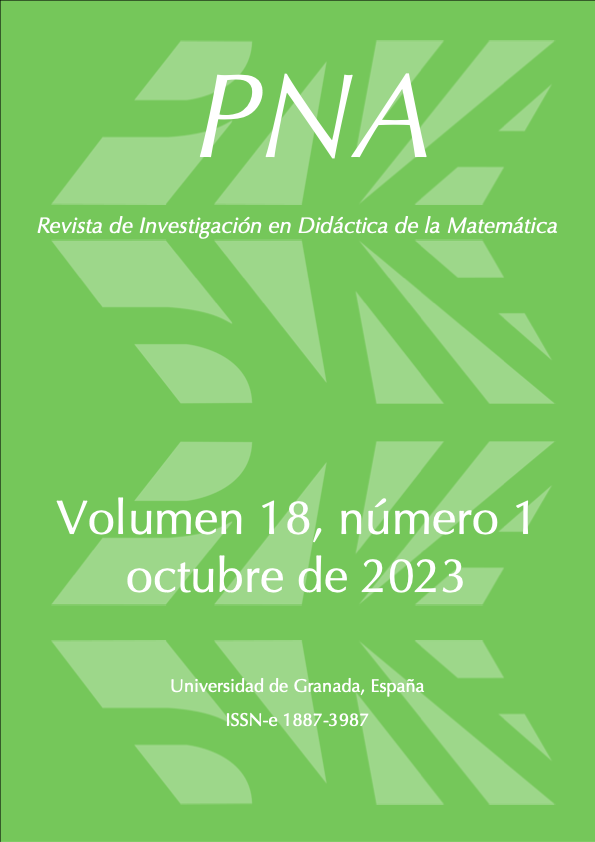“¿Qué habéis descubierto?” Tareas y discusiones colectivas utilizando diferentes representaciones durante y después de los estudios de clases
DOI:
https://doi.org/10.30827/pna.v18i1.27033Palabras clave:
Discusión colectiva, Estudio de clases, Práctica docente, Representaciones, TareasResumen
Con base en un estudio de caso, pretendemos comprender en qué medida la participación de una profesora en estudios de clases se refleja en su práctica. La recogida de datos incluyó observación participante (diario de bordo y grabaciones de audio/vídeo), recopilación documental (tareas y planes de clase) y entrevista. Los resultados indican que participar en estudios de clases, planeando discusiones colectivas a partir de respuestas de los alumnos, aportó cambios en la práctica de la profesora. Ella propuso una tarea que permitió a los alumnos hacer conexiones entre representaciones y, en la discusión colectiva, incentivó la participación de varios alumnos y les desafió a ir más allá de la tarea, lo que no hizo en los estudios de clases.
Descargas
Citas
Bogdan, R., e Biklen, S. (1994). Investigação qualitativa em educação. Porto Editora.
Chapman, O. (2013). Mathematical-task knowledge for teaching. Journal of Mathematics Teacher Education, 16(1), 1-6. https://doi.org/10.1007/s10857-013-9234-7 DOI: https://doi.org/10.1007/s10857-013-9234-7
Franke, M.L., Kazemi, E., & Battey, D. (2007). Understanding teaching and classroom practice in mathematics. In F. Lester (Ed.), Second handbook of mathematics teaching and learning (pp. 225-256). Information Age.
Friedlander, A., & Tabach, M. (2001). Promoting multiplie representations in algebra. In A. A. Cuoco & F. Curcio (Eds.), The roles of representation in school mathematics (pp. 173-185). NCTM.
Fujii, T. (2016). Designing and adapting tasks in lesson planning: a critical process of Lesson Study. ZDM, 48(4), 411-423. https://doi.org/10.1007/s11858-016-0770-3 DOI: https://doi.org/10.1007/s11858-016-0770-3
Gomes, P., Quaresma, M., & Ponte, J. P. (2022). Leading whole-class discussions: From participating in a lesson study to teaching practice. International Journal for Lesson and Learning Studies, 12(2), 139-151. https://doi.org/10.1108/IJLLS-02-2022-0022 DOI: https://doi.org/10.1108/IJLLS-02-2022-0022
Inoue, N. (2011). Zen and the art of neriage: Facilitating consensus building in mathematics inquiry lessons through lesson study. Journal of Mathematics Teacher Education, 14(1), 5-23. https://doi.org/10.1007/s10857-010-9150-z DOI: https://doi.org/10.1007/s10857-010-9150-z
Kooloos, C., Oolbekkink-Marchand, H., Kaenders, R., & Heckman, G. (2020). Orchestrating mathematical classroom discourse about various solution methods: Case study of a teacher’s development. Journal Für Mathematik-Didaktik, 41(2), 357-389. https://doi.org/10.1007/s13138-019-00150-2 DOI: https://doi.org/10.1007/s13138-019-00150-2
Lewis, C., Friedkin, S., Emerson, K., Henn, L., & Goldsmith, L. (2019). How does lesson study work? Toward a theory of lesson study process and impact. In R. Huang, Takahashi, & J. P. Ponte (Eds.), Theory and practice of lesson study in mathematics: an international perspective (pp. 13-37). Springer. https://doi.org/10.1007/978-3-030-04031-4_2 DOI: https://doi.org/10.1007/978-3-030-04031-4_2
Mainali, B. (2021). Representation in teaching and learning mathematics. International Journal of Education in Mathematics, Science, and Technology, 9(1), 1-21. https://doi.org/10.46328/ijemst.1111 DOI: https://doi.org/10.46328/ijemst.1111
Ní Shúilleabháin, A. (2018). Enacting curriculum reform through lesson study in the Irish post-primary mathematics classroom. In M. Quaresma, C. Winsløw, S. Clivaz, J.P. Ponte, A. Ní Shúilleabháin, & A. Takahashi (Eds.), Mathematics Lesson Study Around the World: Theoretical and Methodological Issues (pp. 65-85). Springer. https://doi.org/10.1007/978-3-319-75696-7_4 DOI: https://doi.org/10.1007/978-3-319-75696-7_4
Olson, J.C., White, P., & Sparrow, L. (2011). Influence of lesson study on teachers’ mathematics pedagogy. In L. C. Hart, A. S. Alston, & A. Murata (Eds.), Lesson study research and practice in mathematics education (pp. 39-57). Springer. https://doi.org/10.1007/978-90-481-9941-9_4 DOI: https://doi.org/10.1007/978-90-481-9941-9_4
Ponte, J. P. (2005). Gestão curricular em Matemática. In GTI (Ed.), O professor e o desenvolvimento curricular (pp. 11-34). APM.
Ponte, J. P., Mata-Pereira, J., Henriques, A., & Quaresma, M. (2013). Designing and using exploratory tasks. In C. Margolinas (Ed.), Task design in mathematics education. Proceedings of ICMI Study 22 (Vol. 1, pp. 493–500).
Ponte, J.P., & Quaresma, M. (2016). Teachers’ professional practice conducting mathematical discussions. Educational Studies in Mathematics, 93(1), 51-66. https://doi.org/10.1007/s10649-016-9681-z DOI: https://doi.org/10.1007/s10649-016-9681-z
Quaresma, M. e Ponte, J.P. (2016). Comunicação, tarefas e raciocínio: Aprendizagens profissionais proporcionadas por um estudo de aula. Zetetike, 23(2), 297-310. https://doi.org/10.20396/zet.v23i44.8646540 DOI: https://doi.org/10.20396/zet.v23i44.8646540
Rocha, H. (2016). Teacher’s representational fluency in a context of technology use. Teaching Mathematics and Its Applications, 35(2), 53-64. https://doi.org/10.1093/teamat/hrw005 DOI: https://doi.org/10.1093/teamat/hrw005
Stein, M.K., Engle, R.A., Smith, M.S., & Hughes, E.K. (2008). Orchestrating productive mathematical discussions: Five practices for helping teachers move beyond show and tell. Mathematical Thinking and Learning, 10(4), 313–340. https://doi.org/10.1080/10986060802229675 DOI: https://doi.org/10.1080/10986060802229675
Takahashi, A. (2008). Beyond show and tell: Neriage for teaching through problem-solving - ideas from Japanese problem-solving approaches for teaching mathematics. 11th International Congress on Mathematics Education.
Takahashi, A. (2011). Jumping into Lesson Study—In-service mathematics teacher education. In L.C. Hart, A.S. Alston, & A. Murata (Eds.), Lesson Study research and practice in mathematics education (pp. 79-82). Springer. https://doi.org/10.1007/978-90-481-9941-9_6 DOI: https://doi.org/10.1007/978-90-481-9941-9_6
Descargas
Publicado
Número
Sección
Licencia
Derechos de autor 2023 PNA. Revista de Investigación en Didáctica de la Matemática

Esta obra está bajo una licencia internacional Creative Commons Atribución-NoComercial-SinDerivadas 4.0.
10.22521/edupij.2025.14.38
10.22521/edupij.2025.15.151



















